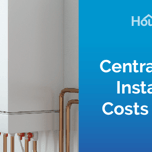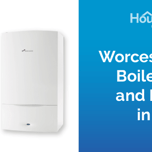Answer these simple questions and we will find you the BEST prices
Which type of solar quotes do you need?
It only takes 30 seconds
100% free with no obligation

Get up to 3 quotes by filling in only 1 quick form

Compare quotes and find yourself the best deal

Increase the value of your home by installing a new boiler
What Is A Combi Boiler?: An In-Depth Guide (2025)

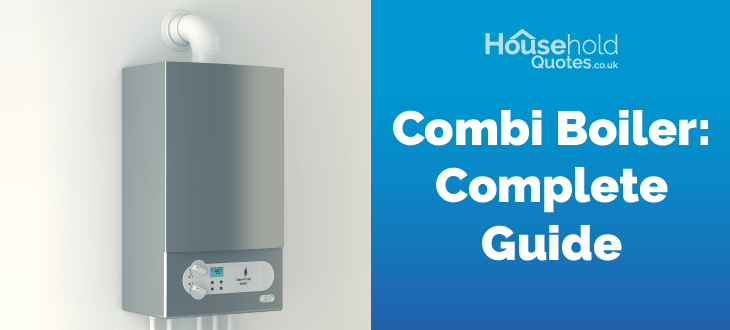
- A combi boiler provides hot water and heating to your home, all from one unit.
- Combi boilers are the most popular option, as they are compact and easy to install.
- You could save up to £580 per year on energy bills if you upgrade to a new combi boiler.
Combi boilers, also known as combination boilers, are an all-in-one heating solution that allows us to access heat and hot water from one unit. Their compact size and high-efficiency levels make them a popular choice for homeowners looking to upgrade their old heating systems.
In this guide we’ll look in depth at what a combi boiler is, how it works and why installing a new combi boiler can save you money. We’ll weigh up the advantages and disadvantages and discover whether a combi boiler is the right choice for your home.
If you're considering a boiler replacement but don’t know where to begin, we can help. Finding a trusted installer can be a challenge, particularly with so many choices out there. Doing your own boiler comparison, filtering through customer reviews and endlessly sending off enquiries for quotes can be stressful, and can take weeks!
Instead, you could use our simple quotes form and in just a few short clicks we’ll have all we need to find you up to 3 completely free quotes. We use a network of tried and trusted professionals and match you with the best options in your local area. It’s completely free, and without obligation - so you have nothing to lose! You can find the perfect installer for your new boiler without all the hassle. Find the link below to get started now.
- Quotes from local installers
- Payment by finance available
- Save up to £975
It only takes 30 seconds

What is a combi boiler?
A combination (combi) boiler is an all-in-one system which provides both central heating and hot water for use around the home. This means it can directly deliver hot water to your taps, as and when you need it, and it also sends hot water around your radiators to heat your home.
A combi boiler differs from other boilers, such as the system boiler or regular boiler, because it doesn’t require any separate tanks to store hot or cold water. This is because a combi takes water directly from the mains and heats it as you turn on a tap or switch on the heating.
Whilst this means a combi is great for saving space, it also means combi’s are not able to provide large quantities of hot water. Combi’s are best suited for small-medium sized homes, with less than 2 bathrooms. Homes with higher hot water demands, usually with 3 or more bathrooms, will need the extra store of hot water a system boiler can provide, for example.
Modern, small combi boilers are also renowned for their high energy efficiency. The direct nature of their water supply results in energy savings and they also use condensing technology. This means that heat which would usually escape via the flue pipe during the heating process, is recaptured and used in the heating cycle, resulting in reduced energy waste.
With higher efficiency levels, of up to 92%, replacing an old, inefficient boiler with a new combi model could save you up to £580 each year on bills. This is because older boilers lose efficiency over time. If your boiler is 10 - 15 years old, it could be as low as 70% efficient (or less!) That means for every £1 you spend on heating, you’re losing 30p to an inefficient boiler.
How does a combi boiler work?
A combi boiler works by heating water directly from the mains as and when it is needed, without the need for a hot water storage cylinder or a cold water tank. When hot water or heating is required, the boiler is activated, and heat is transferred to the water through a heat exchanger inside the boiler.
For hot water, the boiler will heat water from the mains and deliver it to outlets, which then get washed away down your drain. For heating, the water will be circulated through the central heating system. Hot water will travel to your radiators and then back to the boiler (as it cools) to be reheated and circulated again.
Step-by-step: How a combi boiler works
-
Heating demand and water intake:
When the heating or hot water tap is turned on, the combi boiler detects the demand. The boiler draws cold water directly from the mains water supply into the unit.
-
Heat exchanger:
The cold water is then rapidly heated by the boiler's heat exchanger, which is powered by a burner.
-
Hot water delivery:
The heated water is instantly available at the tap or shower, providing a continuous supply of hot water on demand.
-
Central heating system:
If the heating is activated, the combi boiler circulates the heated water through the central heating system, delivering warmth to the radiators or underfloor heating. Once the water has circulated, it will return to the boiler to be reheated and continue the cycle.
Combi boilers: all types in the UK
Combi boilers are most commonly run on natural gas, however, there are four main types of combi boiler fuels that you will come across. These are:
- Gas
- Oil
- LPG
- Electric
Each fuel type has its advantages and disadvantages, and depending on your location and circumstances there may be a fuel type that’s better suited for your home than another. Let’s look at each one and the scenarios in which you might use them.
Gas combi boiler
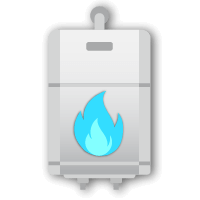
Gas combi boilers are the most common type in the UK because most homes have a direct connection to the National Gas Grid supply. Gas has also, historically, been the cheapest and easiest fuel type to source, making it the most popular option.
Gas combi boilers tend to be easy to install, as they can replace existing gas boilers very quickly. This can make their installation more cost-effective and suitable for a wide range of properties.
Oil-fired combi boiler
For those homes that are not connected to the gas grid, there are alternative options. One of the most common is oil.
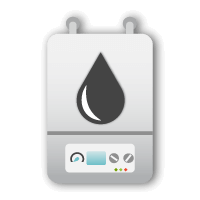
Oil can be used to fuel the flame inside of a combi boiler, which provides the heat. Oil is usually fed to the boiler via a large storage tank, this can be kept outside of the property (sometimes in a storage shed or even buried underground). The storage of oil needs to be large to ensure your boiler doesn’t run out of fuel when you most need it.
Oil is considered a cost-effective option for those not connected to the grid, such as rural properties. Modern oil boilers also use condensing technology for improved efficiency. When considering this option, however, you should take into account the costs of purchasing oil in large quantities and ensure you have the storage space for the tank.
LPG combi boilers
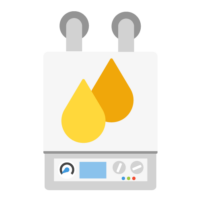
LPG stands for Liquefied Petroleum Gas and is also used for homes in remote areas without access to the grid. LPG is known for its efficiency and lower carbon emissions.
It is a combination of hydrocarbon gases, primarily propane and butane. It is stored and transported in a liquid state under moderate pressure, and when released, it evaporates into a gas for use in different appliances. It is usually supplied in canisters, cylinders or bulk storage tanks.
LPG combi boilers require an external fuel tank or storage, which can be in the form of small portable cylinders or a permanent tank. Many manufacturers offer LPG only, or conversion kits, for their combi boiler models making this fuel another accessible off-grid option.
Electric combi boilers
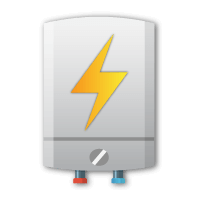
Electric combi boilers are a great option for properties where gas or oil heating is not practical. They run entirely on electricity which means they have the potential to be emissions-free if paired with a renewable energy source (such as solar panels). This also means they avoid the need for large fuel tanks or storage space.
If you live in an area unconnected to the gas grid, but cannot store oil or LPG, an electric boiler may be the perfect choice. Ideal for small homes or apartments, they are also known for their quiet operation and high energy efficiency.
Understanding the various fuel types available for combi boilers is crucial when considering buying a new boiler. Whether your property is connected to the gas grid, relies on oil, or needs an electric heating solution, selecting the appropriate fuel type is essential for efficient and cost-effective heating.
As you explore the options, it's important to seek professional advice to ensure that you choose the best possible boiler type for your requirements. If you’re looking for a trusted engineer to help you with a new boiler replacement, we can help.
It can be daunting trying to determine what boiler your home needs, and sifting through all the options. With a local expert at hand, they can help you find the right fit at the right price. Don’t worry - you don’t need to lift a finger to find them either! Using our simple form, in just a few clicks, we will find you up to 3 engineers, who can offer you free, no-obligation quotes.
Get expert guidance tailored to your needs, and leave the hard work to us! Click below to get started today.
- Quotes from local installers
- Payment by finance available
- Save up to £975
It only takes 30 seconds

Advantages of a combi boiler
Combi boilers are a popular choice for homeowners because of their many benefits. Below are some of the advantages of owning a combi boiler.
-
High-efficiency
Combi boilers are highly efficient, with modern boiler models achieving an efficiency rating of over 90%. This high efficiency can lead to reduced energy consumption and therefore lower heating bills.
-
Space-saving
Combi boilers are compact and don’t require a hot water storage tank, making them ideal for smaller homes or properties with limited space. This space-saving feature can free up additional storage space in the home.
-
Cost-effective
As they provide hot water on demand, combi boilers reduce energy wastage and can lower household heating bills. In addition, they can save money on installation costs, as they do not require additional parts (like a tank).
-
Quick heating and hot water supply
Combi boilers provide instant access to hot water, this allows for a continuous supply when needed.
-
Energy efficiency and reduced carbon footprint
Modern combi boilers are known for their energy efficiency, which can lead to a reduced carbon footprint. They waste less energy compared to older, regular boilers, as they heat water in small amounts as needed.
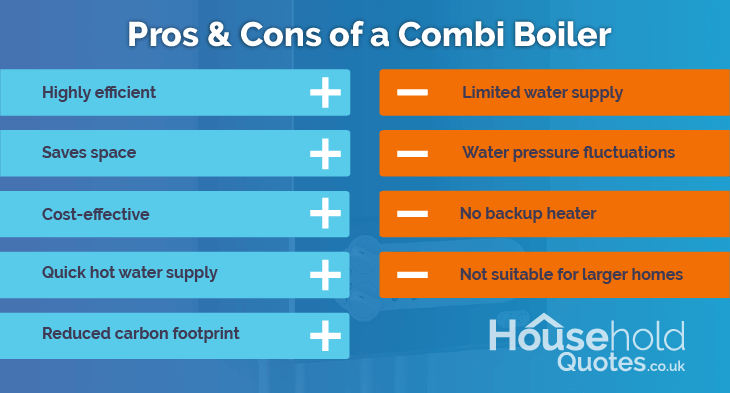
Disadvantages of a combi boiler
Despite their many benefits, combi boilers can have disadvantages, particularly if they are installed in an unsuitable home. Below are some disadvantages that you should keep in mind.
-
Limited hot water capacity
Combi boilers have a limited water capacity due to their size, which can result in a restricted amount of hot water being available at any one time. In general, this means that most combi boilers are not suitable for homes with high hot water demand, such as those with more than two bathrooms.
-
Water pressure fluctuations
A combi boiler may struggle to keep a proper flow of water to your taps if your mains pressure is already low. This can also be the case if multiple hot water outlets are used simultaneously, such as when more than one appliance requires hot water at the same time.
-
No backup immersion heater
Combi boilers do not have a backup immersion heater. Therefore, if the boiler breaks down, there is no alternative method for heating water, potentially leading to a loss of hot water supply until the boiler is repaired.
-
Less cost-effective for larger homes
Combi boilers may be less cost-effective to operate in larger homes, particularly those with more than one bathroom. The limited hot water capacity and potential for reduced water pressure in such properties can impact their overall efficiency and cost-effectiveness.
These disadvantages should be carefully considered when evaluating whether a combi boiler is the most suitable option for your home and its hot water requirements.
Combination boiler cost
The average cost of a new combi boiler ranges from £500 to £3,000, excluding the installation fees. There are many aspects, however, which can affect the total cost including the boiler brand, fuel type, efficiency levels and most importantly, the complexity of the installation.
Depending on the type of boiler you already have, you will find the costs can differ if you’re simply undertaking a like-for-like replacement, or you’re doing a complete system upgrade - in which case you should account for new parts or other charges for adapting your home for the new boiler.
Installation fees are the biggest contributing factor to your overall costs, as this can range from £650 to £2,500. This additional cost includes the engineer's hours, the complexity of the installation and even your location. It may also involve extra expenses for items such as a system power flush, a magnetic filter, thermostatic heat controls and a new boiler flue pipe.
Costs can also be affected by the fuel type you use for your combi boiler, as demonstrated in the table below.
| Combi Boiler Type | Average Cost (Exc. Installation) |
|---|---|
| Gas | £500 to £3,000 |
| Oil | £1,500 to £3,000 |
| LPG | £500 to £3,000 |
| Electric | £590 to £2,500 |
These figures are just estimates, and it’s important to know that new boiler costs for your home can be different. To ensure you get the best price and expert advice on installing the right boiler for your needs it's important to obtain multiple quotes from registered heating engineers.
Searching for an installer you can trust, who’s local and knowledgeable about the needs of your homes in your area, can be a challenge. That’s where we come in! We’ve spent years compiling a network of professional engineers, who are trustworthy and highly recommended. Using our simple form, we can connect you with up to 3 of our best engineers from your area.
Their local knowledge and experience can help you get the very best out of your new boiler, and even better - for the most competitive combi boiler prices! Using our form you can get up to 3 free, no-obligation quotes so you can compare costs and make the right decision for you. There’s nothing to lose! And you can avoid endlessly searching the web for a good deal. Simply click below to get started today.
- Quotes from local installers
- Payment by finance available
- Save up to £975
It only takes 30 seconds

What should you consider when choosing a combi boiler?
There are some key factors you should consider when choosing the right combi boiler for your home. Understanding a boiler's efficiency, performance and cost-effectiveness are just a few. You also need to understand your home's unique demands and ensure the boiler you choose can provide you with everything you need, long-term.
Below are some crucial aspects to consider:
-
Heating output
This is measured in kilowatts (and is often referred to as a boiler ‘size’). The higher the output the more radiators your boiler can heat, therefore if you have a larger home you will need a fairly powerful boiler. On the other hand, if you have a small home with very few radiators you should look for a smaller output. This way you don’t pay more on your energy bills than you need to!
A professional engineer will be able to support you in identifying the output/size of the boiler you need.
-
Hot water demand
Consider the hot water requirements of your household to choose a combi boiler that can consistently deliver an adequate supply for baths, showers, and taps.
Remember that most combi boilers can only serve small to medium-sized homes. Those with more than 2 bathrooms should consider a system boiler, as it can supply more hot water to multiple bathrooms at once.
-
Energy efficiency
Look for combi boilers with high energy efficiency ratings, such as A-rated models or those over 90%, to minimise fuel waste and reduce heating costs.
-
Fuel type
Determine the most suitable fuel type based on your property's infrastructure and availability, whether it's gas, oil, or electric.
-
Installation space
Think about the available installation space in your home and select a compact combi boiler that fits seamlessly into the area you want it. Most combi boilers are designed to fit into a standard kitchen cupboard for example.
-
Warranty and support
Research the warranty offerings and after-sales support provided by manufacturers to secure long-term peace of mind and assistance.
By considering these factors and seeking professional guidance, you can make a well-informed decision when selecting a combi boiler that meets your specific requirements and enhances your home comfort.
Find combi boiler suppliers in the UK
Once you’re ready to install a new combi boiler for your home, you should seek the support of a registered engineer to help you find and install the best combi boiler option to suit your needs. Finding a trusted installer can seem like an overwhelming mission.
Obtaining quotes usually involves waiting weeks for a call-back or email, often the costs are astronomical! Some engineers might not be fully registered or have conflicting customer reviews making your journey to find someone you trust even more difficult.
Avoid all of this and cut straight to the good part! Using our form you can access up to 3 free quotes, all from trusted engineers in your local area. There’s no obligation attached, and you’ll get to compare competitive quotes from installers who have been tried and tested.
If you want to ease your way into a cosy new home, with an expertly installed, highly efficient combi boiler, simply click the link below to get started.
- Quotes from local installers
- Payment by finance available
- Save up to £975
It only takes 30 seconds

Frequently asked questions
Combi boilers provide central heating and hot water to a home from one compact unit. Combis are best for small to medium-sized homes. Learn what a combi boiler is and when it’s best used.
They can cost between £500 to £3,000, excluding installation fees. Combi boiler costs can vary depending on factors such as the boiler brand and the complexity of your installation.
Combi boilers are best suited to smaller properties, as they are not capable of providing for high hot water demands. Learn more about combi boiler pros and cons.
A combi takes water from the mains supply and heats it on demand to provide hot water for your taps and radiators. Discover how a combi works to perfectly heat your home.

Becky has been bringing quality advice to homeowners since 2021. As an experienced writer, she is keen to help our customers find the help they need when they need it.


